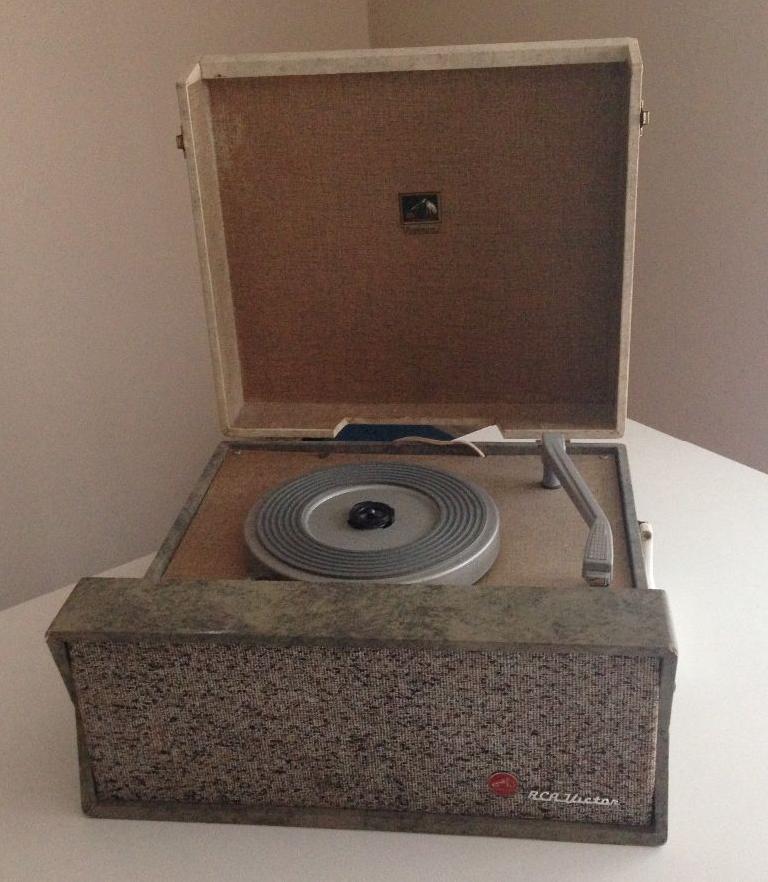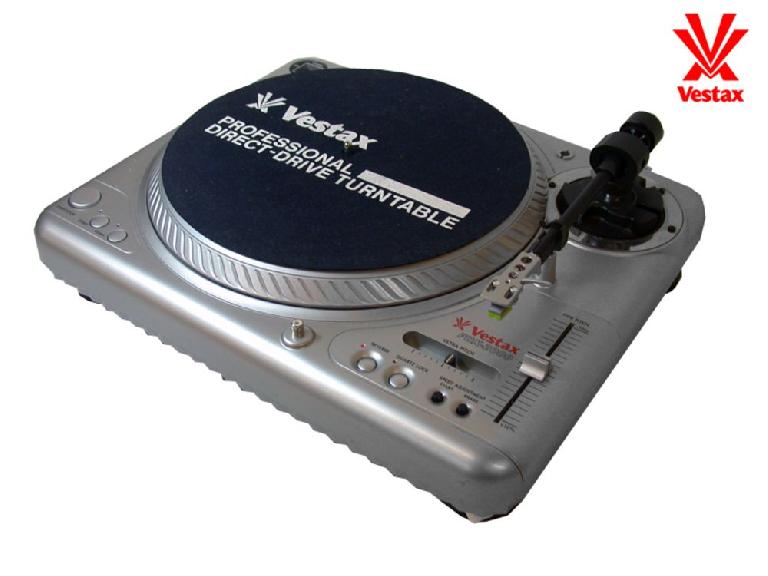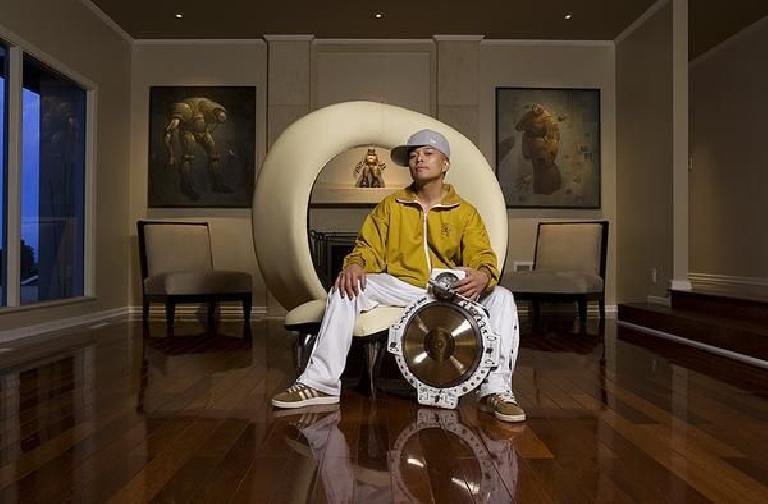What is a turntablist?
1) one who has the ability to improvise on a phonograph turntable
2) "one who uses the turntable in the spirit of a musical instrument" (DJ Babu)
3) a musician; a hip-hop disc jockey who in a live or spontaneous situation can manipulate or restructure an existing phonograph recording (in combination with an audio mixer) to produce or express a new composition that is unrecognizable from its original ingredients.
A turntablist speaks with his or her hands
The history of turntablism dates back to the late 1800s with the invention of devices that were able to play back sound. Thomas Edison invented the 'phonograph', which was a device that played recorded sounds from round cylinders. The quality on the phonograph was not the best and each recording lasted for one only play.
Edison’s phonograph was followed by Alexander Graham Bell’s graphophone. The graphophone used wax cylinders which could be played many times. Cylinder phonographs and graphophones were used to listen to pre-recorded music, and could also be used to make recordings.
On November 8 1887, Emile Berliner, a German working in Washington, D.C., patented a successful system of sound recording. Berliner was the first inventor to stop recording on cylinders and start recording on flat disks or records. The first records were made of glass, then later zinc, and eventually plastic.
Emile Berliner founded "The Gramophone Company" to manufacture his sound disks (records) and the gramophone that played them. To help promote his gramophone system Berliner persuaded popular artists to record their music using his system. He used Francis Barraud’s painting of 'His Master’s Voice' as his company’s official trademark.
Emile Berliner sold the licensing rights to his patent for the gramophone and method of making records to the Victor Talking Machine Company (RCA) who made the gramophone a successful product in the United States.
Fast Forward to the 1970s
The Technics SL-1200 was a series of turntables originally manufactured from October 1972 until 2010 by Technics. The Technics SL-1200 and later the SL-1210 models became the industry standard in the global DJ market until production ceased.
Hip hop formed in the 1970s when block parties became popular in NYC. DJs would play and scratch in the breaks in the record. Afrika Bambaata began organizing block parties all around The South Bronx. He formed the Zulu Nation, a group of socially and politically aware rappers, B-boys, graffiti artists and other people involved in hip-hop culture. He became known as the Master of Records.
Kool Herc was a Jamaican American DJ who used two copies of the same record to elongate the break. His breakbeat style Djing developed the blueprint for hip-hop music.
Grandmaster Flash is a legendary DJ who developed and mastered innovations that are still standard DJing techniques today. These techniques include the backspin (also called the quick-mix theory) punch phrasing, and the Clock Theory. By using duplicate copies of the same record, Grandmaster Flash would play the break on one record, and switch quickly to the other turntable where the same beat was cued up and ready to play. By backspinning, the same short phrase of music could be looped indefinitely. Grandmaster Flash and the Furious Five were inducted into the Rock and Roll Hall of Fame in 2007, becoming the first hip hop act to receive this honor.
In 1982 an American film called Wildstyle was produced by Charlie Ahearn, and is considered the first hip hop motion picture. Grandmaster Flash was pictured DJing in the movie in his mother’s kitchen.
In 1983, scratching made its debut on record and on TV with Herbie Hancock. Grand Wizard D. ST (now known as Grand Mixer DXT) recorded the scratches for Herbie Hancock’s 'Rockit' which introduced scratching to a worldwide audience.
In 1984, Run D.M.C released their self-titled album, Run D.M.C, which made them the first group in hip hop to have a gold album. Their DJ, the late Jam Master J, went on to found the Scratch DJ Academy in Manhattan to "provide unparalleled education and access to the art form of the DJ and producer.”
1985—Mixmaster Mike (who later joined the Beastie Boys) began Djing. Scratching became much faster and tears were heard for the first time.
In 1985, the DMC World DJ Championships, an annual DJ competition hosted by Disco Mix Club (DMC) began. The first year the competition was a mixing only competition, then turntablism was introduced later on.
In 1986 two scratches called chirps and transforms became being heard. The transform scratch has become associated with Philadelphia DJ Jazzy Jeff, who was one half of the hip-hop duo DJ Jazzy Jeff & The Fresh Prince along with Will Smith.
1988 was the 'Joe Cooley Era', in scratching, and the West Coast Djs became known for fast scratches and fast tears.
In 1988 DJ Cash Money performed using the Gemini MX-2200 at the DMC’s, and brought change to the culture through new equipment & skill.
DJ Steve Dee from Harlem, NYC was the inventor of beat juggling and the founding member of the original DJ group "The X-Men" (today known asThe X-Ecutioners). The original name for beat juggling was simply 'The Funk'. In 1990, Steve Dee won the New Music Seminar Battle for World Supremacy and in 1991 won the DMC East Coast Championship.
During the late 1990s Vestax launched a new flagship range of professional DJ turntables. The PDX models had higher specifications than the Technics SL1210/SL1200 and were priced in direct competition with them.
In the late 1980s and early 1990s many innovations took place in scratch culture, and in 1992 Team Scratching was introduced at the DMCs. Around this time, an important scratch called the Original Flare was invented by DJ Flare. DJ Disk, who was DJ QBert’s partner in the early 1990s invented the Orbit, (also known as the two click flare) and D-Styles invented the one click flare. DJ Flare Invented the three-click flare, and a variation to the three click flare.
In 1992, DJ Qbert, Mixmaster Mike and DJ Apollo joined forces and became the Rock Steady Djs. Together they won the 1992 Disco Mix Club World DJ Championships (DMC) world title. Qbert was also one of the founding members of the Invisibl Skratch Piklz, who were the first to apply the band concept to turntablism. DJ Qbert is a true legend; he’s invented many techniques and scratches, and formed a company called Thud Rumble which helps to promote turntablist culture. He’s also the winner of many DMC World Championships together with Mixmaster Mike, including the DMC World Championships in 1993 and 1994, performing under the name Dreamteam.
In 1996, combos with crabs and flares started being heard as turntablism evolved. Another notable event in 1996 was DJ Swamp’s outstanding routine at the DMC US DJ Championship. As a first-time entry, he performed a rock based routine and won the title. DJ Swamp went on to form Decadent Records, which allowed him to distribute his scratch tools vinyl and digital releases. Under this label he invented several DJ tools that are considered standards, including his infamous "skip-proof scratch tool" records which have the same sample repeated over and over. This technique has been copied by most battle breaks and scratch records.
In 1997 DJ Qbert, along with his crew The Invisible Skratch Piklz, created a series of videos entitled Turntable TV. Now out of print, the first 5 episodes were released on VHS and contained demonstrations, showcases, skits, and other DJ related content.
In 1998, the Scratch Perverts, a UK DJ duo emerged onto the scene. Their technical contributions include the 'feedback' technique, inspired by Jimi Hendrix. That same year, DJ Qbert released WaveTwisters, a live action movie that was animated to a scratch sound track.
In 1999 the turntable outsells the electric guitar in Japan. Scratch DJing becomes popular worldwide and many top turntablists are booked to play at big raves.
In 1999, Miami-based DJ Craze wins three consecutive DMC World Championships in 1999 & 2000 as the World DMC Champion, and in 2001 as the World DMC Team Champion.
By the year 2000, turntablism and turntablists had become widely publicized and accepted in the mainstream and within hip hop as artists. The advent of digital DJing made it possible for turntablists to perform using software like Traktor and Serato. Digital turntablist techniques and new equipment gave birth to controllerism, the art and practice of using musical software controllers to create music.
DJ Battles
DJ battles have historically been, and continue to be an important way for DJs to showcase their turntablism skills, and advance the art form. In the 'Golden Age' of turntablism, the three major DJ competitions were: DMCs, ITF, and the Vestax DJ Extravaganza. Current major battles for DJs include the DMCs and Red Bull Three Style. After learning turntablist techniques, DJ battles are often the starting point for turntablists to begin their careers.
Famous Crews
Invisible Skratch Piklz—started out with DJ Qbert, Mix Master Mike, and DJ Apollo, now DJ Qbert, DJ Disk, Shortkut, DJ Flare, Yogafrog, D-Styles, and A-Trak. The Invisibl Skratch Piklz are still busy playing shows around the world!
Beat Junkies—The Beat Junkies started in 1992 by J. Rocc. The original members included Curse, Rhettmatic, Melo-D, Icy Ice, Symphony, & What?!. Shortkut, D-Styles, Red-Jay, Havik, and Tommy Gun, DJ Babu, who coined the term 'turntablism' and Mr. Choc.
X-Executioners—The X-Ecutioners are a group of turntablists from New York City. The crew currently consists of Total Eclipse, DJ Boogie Blind, DJ Precision. Original members include: Mista Sinista, Rob Swift, and Roc Raida. Roc Raida sadly passed away on September 19, 2009.
Allies—Turntablist crew consisting of DJ A-Trak, DJ Craze, DVLP and Infamous
DJ A-Trak—A Canadian DJ named A-Trak was the first DJ to win all three major DJ competition titles (DMC, ITF and Vestax), as well as being the first DJ to win five World Championships. He won the DMC World DJ Championship in 1997 at the age of 15, making him the youngest and first Canadian winner of the competition.
Turnstylez—A Canadian DJ crew consisting of DJ Grouch, D-Scratch and Lil’ Jazz. In 1998 Turnstylez won the 1998 ITF Western Hemisphere Team Category in New York defeating The Allies (DJ Craze and A-Trak’s crew). They represented Canada in the ITF world finals that year in Amsterdam, competing against the defending champs the Beat Junkies, placing third.
The turntablist culture continues to grow on a worldwide scale, and is kept alive through the efforts of the DJs themselves, the companies who produce products for the DJs to use, and the venues, DJ battles promoters and audiences who support the art form. I hope that the turntablist community continues to grow in the years to come!
Watch Sara Simms demonstrate how to create chirp and flare scratches here.





 © 2024 Ask.Audio
A NonLinear Educating Company
© 2024 Ask.Audio
A NonLinear Educating Company
Discussion
Want to join the discussion?
Create an account or login to get started!